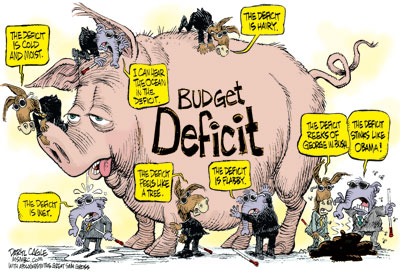Remember a conservatism that included the principles of balanced budgets and spending cuts? No longer. The new conservatism in vogue inside the Washington, D.C., beltway is ?spendthrift conservatism,? which can be defined as claiming to be cutting spending and paying off the national debt while at the same time increasing both.
The GOP House struggled against the Democratic Senate and President during the first half of April, but this latest bout was as phony as a professional wrestling match. The bad acting included House Speaker John Boehner (R-Ohio) and Senate Majority Leader Harry Reids (D-Nev.) April 8 joint statement on the budget deal for fiscal 2011 spending:
We have agreed to an historic amount of cuts for the remainder of this fiscal year, as well as a short-term bridge that will give us time to avoid a shutdown while we get that agreement through both houses and to the President. We will cut $78.5 billion below the Presidents 2011 budget proposal.
It sounded like a big spending cut, but it was only $38.5 billion less than the stimulus-bloated fiscal 2010 budget. And then the non-partisan Congressional Budget Office (CBO) reported that about half of the $38.5 billion would never have been spent anyway; the funds were leftovers that agencies admitted they didnt need. And nearly all of the remaining cuts were for future fiscal years; only $352 million of the cuts was for fiscal 2011.
Since the proposed cuts were far off in the future, there was plenty of time to reverse those cuts. Not that the Obama administration needed any time. As soon as the ink was dry on his signature on the bill, he attached a signing statement claiming hed ignore the laws requirement to defund four Czar positions in the executive branch. So the historic amount of cuts has already sunk from an alleged $78.5 billion to somewhere south of $353 million or less than 1/500th of the deficit.
Add in the contingency spending of about $8 billion for our multiplying foreign wars that was tucked into the bill, and Congress hadnt cut a thing. To the contrary, theyve increased spending, even as leaders touted an historic amount of cuts.
One indication the GOP leadership is in on Obamas game of the ever-disappearing spending cuts is that House Speaker John Boehners spokesman, Michael Steel, told the Washington, D.C., tabloid The Hill that its not surprising that the White House, having bypassed Congress to empower these Czars is objecting to eliminating them.
 The obvious question is: If theyre not surprised Obama didnt keep the agreement he brokered or follow the law he signed, then why did they make the agreement with him in the first place?
The obvious question is: If theyre not surprised Obama didnt keep the agreement he brokered or follow the law he signed, then why did they make the agreement with him in the first place?
The question answers itself. Democrats and Republicans play different roles in the same game against the taxpayer. The Democrats play the role of the profligate. The Republican leaderships role is not to make cuts but to appear to make cuts.
Enter the GOP fiscal 2012 budget proposal by Rep. Paul Ryan (R-Wis.). This budget proposal is touted as a great conservative alternative to Obamas budget, yet Ryans plan proposes a $1 trillion deficit for 2012, nearly as large as Obamas proposed 2012 deficit. Sure, it promises to cut more than Obamas latest budget does in future years. But the House will have another budget proposal next year, as will Obama, and this one will be forgotten by then. Moreover, the promised cuts are based on cutting future projected spending in Obamas earlier budget proposal; they are not based on cutting spending in the absolute sense. Thus, even accepting the Ryan plan at face value, it promises at least 20 more years of budget deficits, as well as steady increases in federal spending after dipping slightly from 2011 to 2012. Call me old-fashioned, but Ive never considered a $1 trillion deficit conservative. Nor are 20 more years of deficits.
Republican Party apologists will rationalize that the GOP-led House must compromise with the Democratic Senate and the Democratic President, and that nothing better than the Ryan proposal is achievable. But thats nonsense. Under the Constitution, the House has the power to turn off the spending spigot all by itself, regardless of what the Senate or the President do. In fact, under the Constitution, the House must initiate all money bills. The House has to agree to all spending, or it doesnt exist. The worst the President can do is throw a tantrum and veto lower spending levels in House-initiated legislation, bringing government to a stop. But that leaves a big-government-loving President and Senate in an untenable position. If the House left them a choice of a smaller government or a government shutdown, which option would Obama eventually choose? Obviously, a government shutdown takes Obama and other big spenders further away from their goals.



